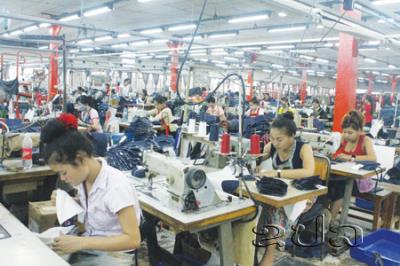KPL
(KPL) The Government has made a decision to lift the minimum wage from 626,000 kip to 900,000 kip per month, considering the move an effort to prevent labour from flowing to neighbouring countries.
“The wage adjustment will take effect on 1 April 2015,” said Director General of Labour Management Department, Ministry of Labour and Social Welfare, Mr. Phongsaysack Inthalath, at a press conference held yesterday in Vientiane.
 “The wage adjustment will take effect on 1 April
2015”: Director General of Labour Management Department, Ministry
of Labour and Social Welfare, Mr. Phongsaysack Inthalath.
“The wage adjustment will take effect on 1 April
2015”: Director General of Labour Management Department, Ministry
of Labour and Social Welfare, Mr. Phongsaysack Inthalath.
(KPL) The Government has made a decision to lift the minimum wage from 626,000 kip to 900,000 kip per month, considering the move an effort to prevent labour from flowing to neighbouring countries.
“The wage adjustment will take effect on 1 April 2015,” said Director General of Labour Management Department, Ministry of Labour and Social Welfare, Mr. Phongsaysack Inthalath, at a press conference held yesterday in Vientiane.
He said that the minimum wage will apply to employees with minimal labour skills, working 26 days per month, six days per week and eight hours per day. It will not affect those employed by non-governmental organizations in Laos, civil servants or contracted workers working at government or Party organizations, the Lao Front for National Construction, mass organizations, or the Ministries of National Defense and National Security, Mr. Phongsaysack explained.
However, the minimum wage for workers hired to do dangerous jobs where they are likely to be exposed to a harmful working environment including chemical substances, radiation, communicable diseases, air pollution, or others which pose threats to their health, will be paid a 15% higher wage than the rate applied to those aforementioned.
The upward movement of the minimum wage is to provide employees with more income due to the increasing cost of living and cost of consumer goods which is affecting the living conditions of workers in the country.
KPL